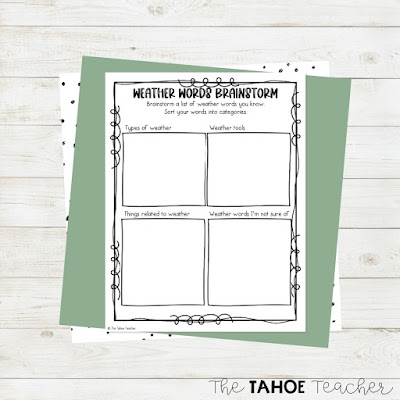Phenomenon-Based Learning
Hey, y'all. Have you heard of Phenomenon-Based Learning yet? If you've followed the blog for awhile, you've probably heard me mention it a time or six. That's because it's amazing!
PhenomBL is an instructional strategy used in Finland to integrate subjects and make learning connected across the curriculum. Students are given a topic like weather, plants, civil rights, or WWII and explore the topic in each subject area. I'll give you an example in just a sec. It's much deeper than a simple thematic unit!
First, for some background info, you can grab this informational freebie from by TPT store. It has all the basics of what PhenomBL is about and what it entails.
Now, let's take a look at what a PhenomBL unit looks like.
The first framework in this series is all about the weather. You'd start the unit by posing an Essential Question. In this case, it's "How does the weather affect plants, animals, and people?" The kids will learn about the weather in each subject area.
At the beginning of the unit, students will brainstorm what they know about weather and what questions they have (the K and W in a KWL chart). Then, you may have students brainstorm words they know or look over a list of weather-related words and see what words stand out to them.
In reading, students would read all about the weather--types of weather, how living things adapt to weather and climate, and research any of the questions on their beginning of the unit brainstorm. This is a great time to integrate fictional and nonfictional texts and help students decipher what they can use as answers to their questions and where to go next for more clues.
In math, students can measure precipitation with a rain gauge (or ruler if it's snow), graph high and low temperatures, track changes over time, measure barometric pressure, and take any number of weather-related measurements. If you're working on subtraction, this is a great time to find the temperature range for each day of the week. Anytime we can show students how to apply what they're learning to real life situations, it's a win!
In science, the topics are pretty straight forward. Students can learn all about weather patterns, vocabulary, how meteorologists make predictions and how they record things, types of clouds, types of climates, plant and animal adaptations to weather, and more. Students can analyze data, make predictions, and ask and answer their guiding questions.
In social studies, the focus could be on how people adapt to different climates and weather patterns, why people choose to live in different climates, how climate change has affected (or could affect) humans, and so much more.
The biggest part of PhenomBL is that it is student-centered learning. As teachers, we'll be providing the experience and guiding students in their learning, but the work of learning is largely up to them. Throughout the whole PhenomBL experience, students are asking and answering their own questions. This is not a teacher-directed unit.
Now, you will need to pre-teach some vocabulary, some basics about weather (if you teach upper elementary, students will already have some background knowledge), and some skills on how to do research to answer their questions, but the overall unit is largely student-directed.
The premise behind Phenomenon Based Learning is that students see how all the different subject areas are related when exploring different topics. No matter what topic you're studying, reading, math, science, and social studies are all involved. When students apply the skills they are learning in every subject to one topic, they can see how things are connected in the world. Things start to make sense and dendrites grow all over their brains! Call me a nerd, but it really is fascinating.
You can find out more about this weather PhenomBL framework here or by heading straight to my TPT store. This is the first in this series, so check back frequently for more topics/units of study coming soon.
I hope you have a wonderful week and I'll talk to you soon.
Stay cozy,








No comments
Post a Comment